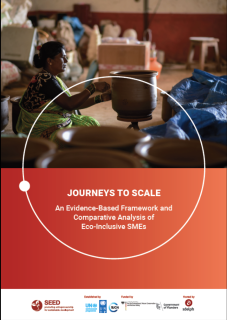
Eco-inclusive SMEs (enterprises who focus on providing socially inclusive and environmentally sustainable impacts) are important agents in the global confrontation against environmental degradation, and also for the inclusion of socioeconomically marginalised communities in global value chains. These enterprises have received increasing attention from economic development actors, climate and environmentally focused organisations, as well as business development supporters in recent years. However, eco-inclusive SMEs’ specific business journeys and characteristics remain insufficiently investigated in previous research.
This report from SEED outlines different types of eco-inclusive SMEs, including a comparative analysis of their characteristics and differences. It also provides details as to how support organisations can tailor their programmes to the specific needs of a particular eco-inclusive enterprise profile. Furthermore, this report serves as a guide for eco-inclusive enterprises providing lessons and insights into potential challenges and opportunities in their individual journeys to scale.
In this primary edition of a series of reports, SEED provides a comprehensive typology on eco-inclusive SMEs. The typology and analysis are informed by over 20 years of supporting more than 1,000 eco-inclusive entrepreneurs across Asia, Africa and the Americas, and enriched by 36 in-depth interviews they conducted with nine SEED Awards Winners or Finalists between June 2020 and June 2021.
